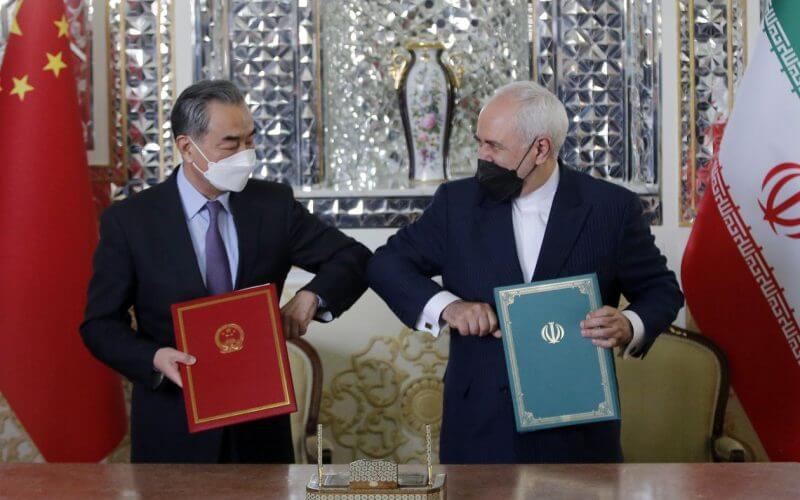Iranian Foreign Minister Javad Zarif and Chinese Foreign Minister Wang Yi signed a 25-year “Comprehensive Strategic Partnership” Saturday in Tehran, forecasting a potential for greater Chinese influence in the Middle East and, if implemented, skirting efforts made by Trump-era sanctions to isolate the Iranian regime’s economy.
“Pleased to welcome my Chinese friend & counterpart, FM Wang Yi, to Tehran,” tweeted Zarif. “Excellent exchange on expansion of global, regional and bilateral cooperation in the context of our comprehensive strategic partnership, culminated in the signing of a 25-year strategic roadmap.”
The 25-year “Comprehensive Strategic Partnership” includes a commitment by China to invest $400 billion into Iran’s economy and security in exchange for oil, according to a New York Times report.
The partnership also aims to “expand cooperation and mutual investments in various areas including transportation, railway, ports, energy, industry, commerce and services,” according to a joint statement published in both countries.
The statement mentions a commitment to “enhancing investment and trade exchanges and [to] promote cooperation” in many areas including “nuclear energy for peaceful purposes,” followed by a statement that “the Chinese side appreciates Iran’s constructive role in fighting terrorism and establishing regional peace and stability.”
Former Iran hostage and Chinese American Xiyue Wang told The Foreign Desk that, while this China-Iran deal has been in progress since 2016 and was leaked in June 2020, it did not come to fruition until now because “Trump’s max pressure was still in place, and it was not clear at the time who would be the next U.S. president and which direction America would take its Iran policy.”
There is a direct connection to China’s deepening relations with Iran and the Biden administration’s push to reenter the 2015 JCPOA, according to Xiyue, who believes “it is reasonable to argue that China sensed the changing direction of the U.S. policy towards Iran and went ahead to work more closely with Iran since, if Biden appeases Iran, as it appears he does, there will be much less barrier for China to work with Iran in the next few years.”
The deepening relationship between China and Iran via the 25-year partnership “is a test for the Biden administration,” said Xiyue.
Biden must either decide to pressure China away from implementing the deal or pursue further appeasement.
“If the U.S. is determined to put Iran under pressure, it will curtail China’s ability to materialize the deal, because China is risk averse like any other country. If the U.S. under Biden further appeases Iran, China will entrench in Iran and the Middle East at U.S. expenses. The U.S. has immense power in determining the outcome of the deal and China expansion in the Middle East,” he said.









